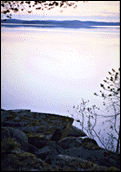|
  On
the same day we went to the vicarage and on the next to the
Alanne place. Their daughter, a 20-year-old intelligent and
God-fearing girl rowed me alone from there up the Vuokinjoki
7½ km. Four weeks earlier the same person had brought me to
Kerälä 17½ km. When I started to speak in a somewhat more
jocular tone, she did not answer me at all, but once I talked
about more serious matters she had very intelligent answers
indeed. A silent, calm, fear of God gives a person dignity.
- Niipaskoski 5 km from the Alanne place, the only rapids
on the Vuokkijoki. - the Vuokinniemi house. The Russians had
attacked and beaten the woman of the house in the spring.
They hit her in the head and she lay ill for many days, all
because she could not give them any food. Poverty brings many
other forms of suffering with it. This is the way some of
the Russians here act. A number of men come in with their
spears, make a lot of noise, demand food for themselves and
hay for their horses; they are willing to pay but are bossy
and make holes in the walls, table and floor with their spears.
They sometimes pay with forged notes, which someone has tricked
them into taking in their travels and which they have not
been able to get rid of elsewhere. The woman in question got
a fake three-ruble note and gave them back a genuine note
for the same sum, that is, she gave them the food and hay
for free. On
the same day we went to the vicarage and on the next to the
Alanne place. Their daughter, a 20-year-old intelligent and
God-fearing girl rowed me alone from there up the Vuokinjoki
7½ km. Four weeks earlier the same person had brought me to
Kerälä 17½ km. When I started to speak in a somewhat more
jocular tone, she did not answer me at all, but once I talked
about more serious matters she had very intelligent answers
indeed. A silent, calm, fear of God gives a person dignity.
- Niipaskoski 5 km from the Alanne place, the only rapids
on the Vuokkijoki. - the Vuokinniemi house. The Russians had
attacked and beaten the woman of the house in the spring.
They hit her in the head and she lay ill for many days, all
because she could not give them any food. Poverty brings many
other forms of suffering with it. This is the way some of
the Russians here act. A number of men come in with their
spears, make a lot of noise, demand food for themselves and
hay for their horses; they are willing to pay but are bossy
and make holes in the walls, table and floor with their spears.
They sometimes pay with forged notes, which someone has tricked
them into taking in their travels and which they have not
been able to get rid of elsewhere. The woman in question got
a fake three-ruble note and gave them back a genuine note
for the same sum, that is, she gave them the food and hay
for free.
There was a man from Alajärvi last summer. Had been a porter
for a few well-to-do farmers, sold the goods, squandered the
money, and had not been seen around. He finally returned home
but when he had no money for food or transport, he came up
with the idea of saying that he had been sent by the Czar
to study the farm, the servants of the Crown and, in particular,
the practices of the tax collectors. He ordered people to
bring all their documents and tax receipts to him. He said,
"There the collector has overcharged you again." He threatened
to fire every single one of them or have them all hanged.
He claimed the Czar was appointing new civil servants and
reducing taxes and had already sent grain to the church in
Hyrynsalmi, where everyone could have as much as they liked
for free. Most of the peasants in Vuokki and other areas actually
left for Hyrynsalmi but turned back in Alanne when they discovered
that no one there knew anything of the matter. The man was
treated well; liquor was brought from the village, and beds
of straw were put in his boat. He was ashamed of his tattered
clothes sometimes but said that he could not take better clothing
on these trips into the wilderness; but they were in his bag.
His pipe with the silver band had mostly fooled the peasants,
since the people who live in Russian Karelia do not smoke
tobacco. The men in Pussila thought he was an itinerant Russian,
but when he came from there 7½ km to Murtovaara, he again
began to put on the same act. Until his former master, who
had returned home, recognized him. The man left in such a
hurry that he forgot his pipe. He drowned in the autumn.
|